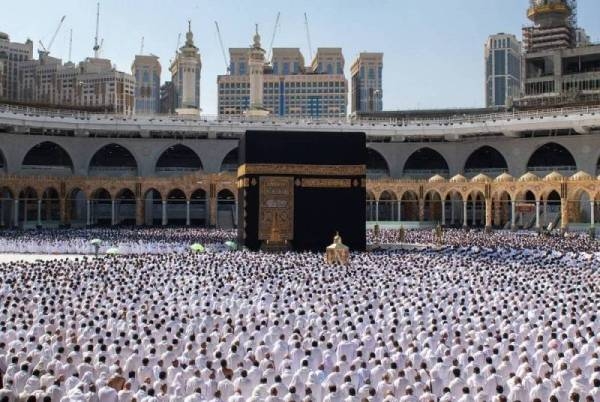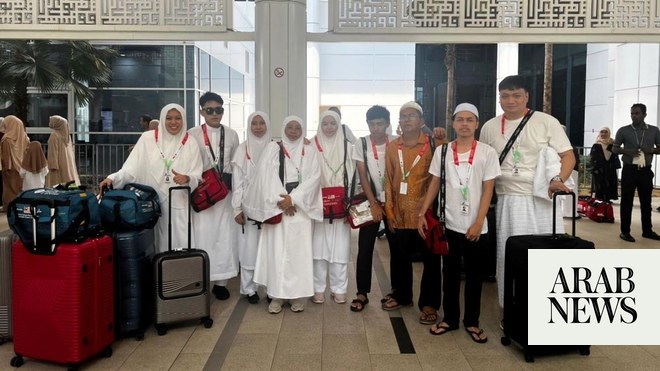
The Ministry of Hajj and Umrah has completed the preparation of the explanatory memorandum for the draft Law for Service Providers of Hajj Pilgrims that will come into force 90 days after its publication in the Official Gazette.
The ministry has invited the public to send their feedback on the draft law via Istitlaa platform.
The draft law included a number of articles that are framed to ensure that service providers are extending the best ever quality services to both domestic and foreign Hajj pilgrims. One of the major features of the draft law is that its provisions are applicable to both domestic and foreign pilgrims.
There are provisions in the law to take punitive measures against those service providers who commit any violations in this regard. The provisions included R500,000 in fine for practicing the service providing activity without obtaining the required license from the ministry.
The ministry stated that the law aims to unify the standards of services provided to pilgrims coming from inside and outside the Kingdom. It is also to regulate the activity of providing Hajj services, boost the transparency of contracting, and stimulate competitiveness in the Hajj services system.
In the event of breaching his obligations by the service provider, the ministry shall take all necessary measures to ensure the provision of the service, including assigning another service provider to provide the service, and recourse against the violator for the financial consequences, no matter how much was the amount.
As per the law, it is permissible for the ministry to resort to specialized companies or technical agencies when it is required to carry out some of the tasks entrusted to it according to the law without prejudice to the basic tasks assigned to the ministry. For this, one or more committees can be formed by a decision of the minister and the committee would have not less than three qualified members, and one of them shall be chairman, and each committee shall have a general secretariat.
The secretary general of the committee and the staffers are responsible to examine violations of the provisions of the law or the decisions issued for its implementation, as well as imposing penalties. The decisions of the committee shall be issued by a majority vote, and shall be approved by the minister or his authorized representative.
The draft law emphasizes that the service provider must provide the best services to pilgrims in accordance with the quantitative and qualitative classification issued by the ministry and the electronic link with the ministry’s systems. The service provider is obliged to provide compensation for pilgrims with the value of services that were not provided to them or value of poor services provided to them that comes below the contracted level.
According to the law, the ministry is responsible for supervising licensed service providers, as well as to monitor their performance in addition to ensuring that the service providers are fulfilling their obligations.
The ministry has also to set mechanisms and controls for allotting spaces for pilgrims at the holy sites and the requirements for operating these spaces by the licensed service providers, as well as to hand over the allotted spaces to the licensed agencies and that is in coordination with the competent authorities.
The draft law aims to unify the standards of services provided to both domestic and foreign pilgrims and to ensure the sustainability of business and investment of licensed firms in order to achieve administrative efficiency and financial solvency.
It’s objectives also include improve services provided to pilgrims, so that they can perform Hajj rituals and visit of the Prophet’s Mosque with ease and comfort; organize the activity of providing Hajj services; raise the transparency of contracting for services; enhance the transparency of contracting for Hajj services and stimulate competitiveness in the Hajj services system and raise the efficiency of workers in the field of serving the guests of God.
There are provisions in the draft law for imposing penalties against those who are found to have violated the provisions of the law and its regulations. These included serving warning notice; slapping financial fine; suspension from practicing the Hajj service providing activity for a certain period of time; lowering the classification granted to the service provider, and canceling the license. The penalty imposed on the violator may be doubled in the event of repeating the violation.
The law stipulates that the ministry has to prepare a list of violations and the corresponding penalties, and it shall allow those, against whom any punitive decision was taken by the committee, to object to it before the competent court within 60 days from the date of notification of the decision.
The draft law prohibits any person from practicing the Hajj service providing activity without obtaining a license, and whoever provides the service without a license shall face penal actions such as a fine not exceeding SR500,000 with the deportation of the violator if he is an expatriate. The fine may be doubled in the event of repetition.
A report about the penal action shall be published in the local newspaper or any other media outlets at the expense of the violator, and this is in accordance with the type of violation committed, its gravity and its effects after the final verdict was issued by the competent court.











